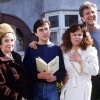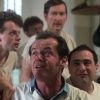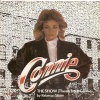Margaret Thatcher was born in 1925, the daughter of a humble grocer, and was later to become Britain’s first female Prime Minister serving three terms in office between 1979 and 1990. Margaret Thatcher (sometimes also known as Mrs T or the Iron Lady) had a controversial political philosophy which emphasised deregulation, flexible labour markets, reform of the trade unions, privatisation of state-owned utilities and industries and reduced social expenditure. Unfortunately, whilst her policies successfully reduced inflation, unemployment increased at an alarming rate.
A decline in Mrs. Thatcher's popularity in the early eighties was inevitable amid a backdrop of recession and growing unemployment but thanks to signs of economic recovery and her handling of the 1982 Falklands War she received a resurgence of support from the public which contributed to her re-election in 1983.
Margaret Thatcher was undoubtedly a force to be reckoned with and thanks to her sharp tongue, sizable shoulder pads and no-nonsense attitude, she comfortably stood her ground in the male-dominated world of politics. In fact, she was so tough that she seemed to be virtually indestructible, reportedly surviving on just four hours of sleep per night and staying awake for the entire three months of the Falkland’s War with only twenty minute cat-naps and plenty of whisky to keep her going. She even survived an assassination attempt in 1984 when the IRA planted a bomb at the Grand Hotel in Brighton where she was staying for a conference. At 2:54am on the 12th October 1984 the bomb detonated in a nearby room killing five people but leaving Mrs. Thatcher and her husband Dennis unscathed.
Whilst Mrs. Thatcher was re-elected for a third term in 1987, her hard-line implementation of the new Community Charge or “Poll Tax” seriously damaged her popularity with the general public and her views on the European Community led to serious dissension within her cabinet. Following the resignation of the Deputy Prime Minister, Geoffrey Howe, over Mrs. Thatcher’s refusal to give a timetable for Britain to join the European single currency, a challenge for the leadership of the Conservative Party was mounted by Michael Heseltine which resulted in a ballot attracting sufficient support to threaten Mrs. Thatcher’s premiership.
On November 28th 1990, a tearful Margaret Thatcher left number 10 Downing Street for the last time and faced the assembled press with a dignified speech thanking all her staff and wishing John Major “all the luck in the world” as the new Prime Minister. Behind the scenes, Margaret Thatcher was devastated and felt betrayed by her cabinet but she didn't let this stop her from pursuing her political career as she immediately continued as a backbench MP for Finchley.










Do You Remember Margaret Thatcher?
Do You Remember Margaret Thatcher?